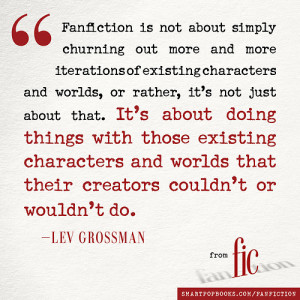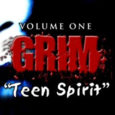 With some of the country’s Meccas of higher education offering courses in fantastical geeky disciplines like Elvish, Skryim, and Zombie media, it’s no surprise that fanfiction has become an interest to the tweeds in academia. Annie Jamison, a professor at the University of Utah with a PhD from Princeton, has recently published a fic: Why Fanfiction is Taking Over the World, which explores the role and importance of fanfiction in modern literature and culture.
With some of the country’s Meccas of higher education offering courses in fantastical geeky disciplines like Elvish, Skryim, and Zombie media, it’s no surprise that fanfiction has become an interest to the tweeds in academia. Annie Jamison, a professor at the University of Utah with a PhD from Princeton, has recently published a fic: Why Fanfiction is Taking Over the World, which explores the role and importance of fanfiction in modern literature and culture.
Jamison expertly edits fic and weaves exploration of the history of fanfiction and fandom culture with the evolution of technology, social media, and the rise and virtual habitats of sub-cultures (which we at sub-cultured.com are all about, naturally). Among my favorite nuggets of analysis offered by Jamison were the evidences of fan fiction predating and predicting commercial and artistic
enterprises. Fans have found ways to share and network their theories, stories,and reactive comments far earlier than the advent of social media sites that discovered that there was perhaps an intrinsic desire for an instantaneous platform for personal musing. Not surprisingly, for every awful expression through fan work published over the last hundred years, there is probably an exponentially larger amount of hogwash posted on twitter in the
last 24 hours (numbers: fudged). See? Fanfiction, the augur of our times. Maybe Jamison would like to use this for the second volume of an anthology series (wink wink, nudge nudge).
Perhaps my favorite treats from this ambitious enterprise(there’s an entire section devoted to Star Trek and the emergence of shipping culture, by the way) was the wide range of contributors who added both personal and academic insight. Among the contributors are Amber Benson of Buffy fame (in case you want to know what it’s like to be shipped), prominent fan fiction writers (yes, that’s definitely a thing and read the book to find out the when and why), and actual
producers of the books/tv shows and movies that we love enough to interpret and create art derived from their sparks creativity. They discuss the significance, legality, and history of fan-produced works as well as the fandoms close to their hearts.
For the casual reader, the text might suffer a bit from the limited number of titles that it covers. This makes sense, for while there are a seemingly unlimited number of fandoms discussed on blogs like livejournal and tumblr (which currently has a large community based around the love affair between a pad of paper and a clock), only few of the bigger names can be really used to take the pulse of the influence and evolution of fanfiction. So if you’re not interested in Harry Potter, Twilight, or in my case Sherlock, your investment in the book might not last its almost 400 pages.
Still, if you’re interested in the contributions of fanfiction as well as its past and future, definitely check this book out. It’s an excellent guide for newbies and perhaps validation for veteran fic-writers.
You can follow Professor Jamison at @pro_anne and purchase or download fic: Why Fanfiction is Taking Over the World here
kaitlyn@sub-cultured.com
tumblr.com/blog/tree-house-of-the-mind

















